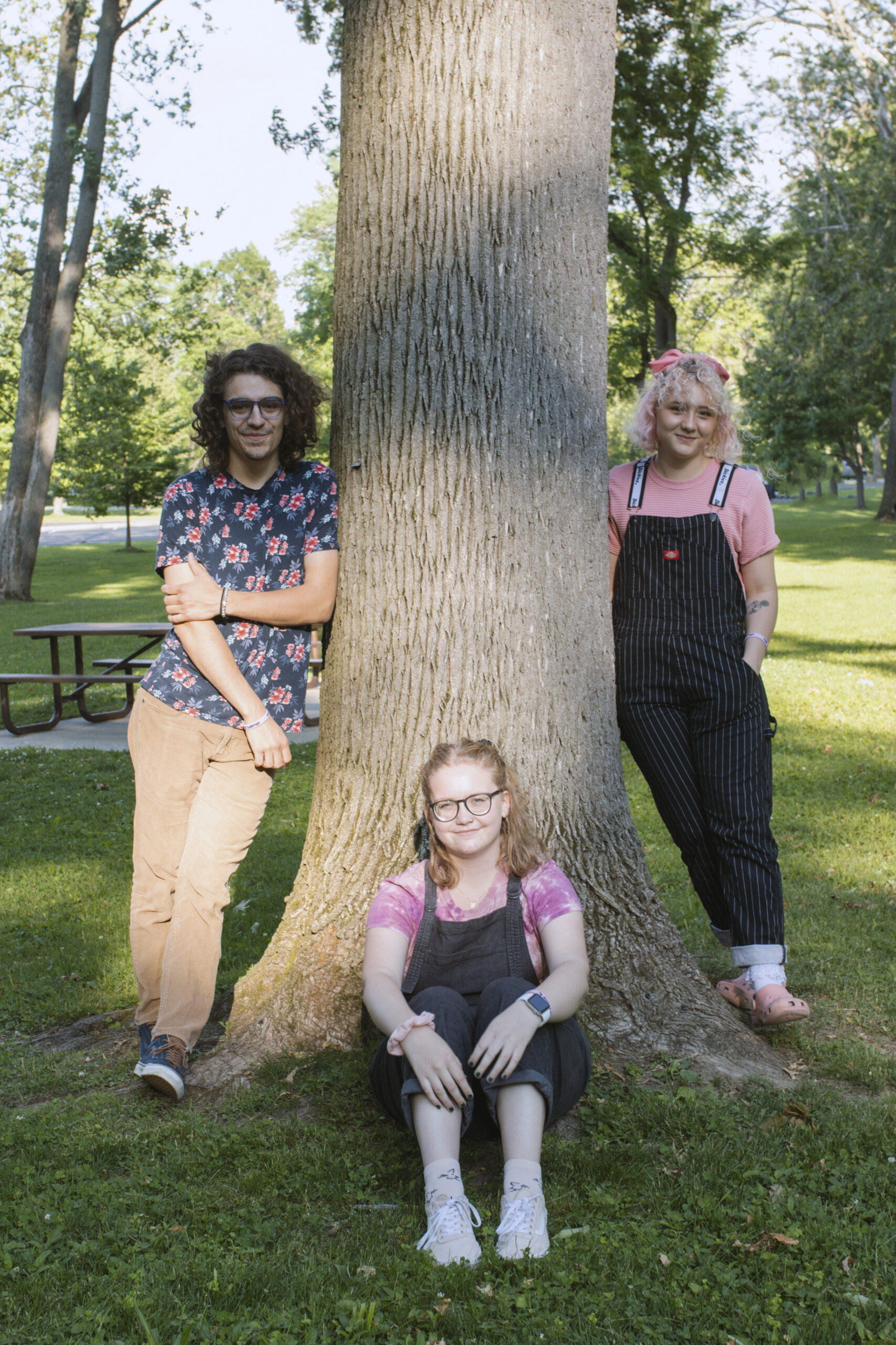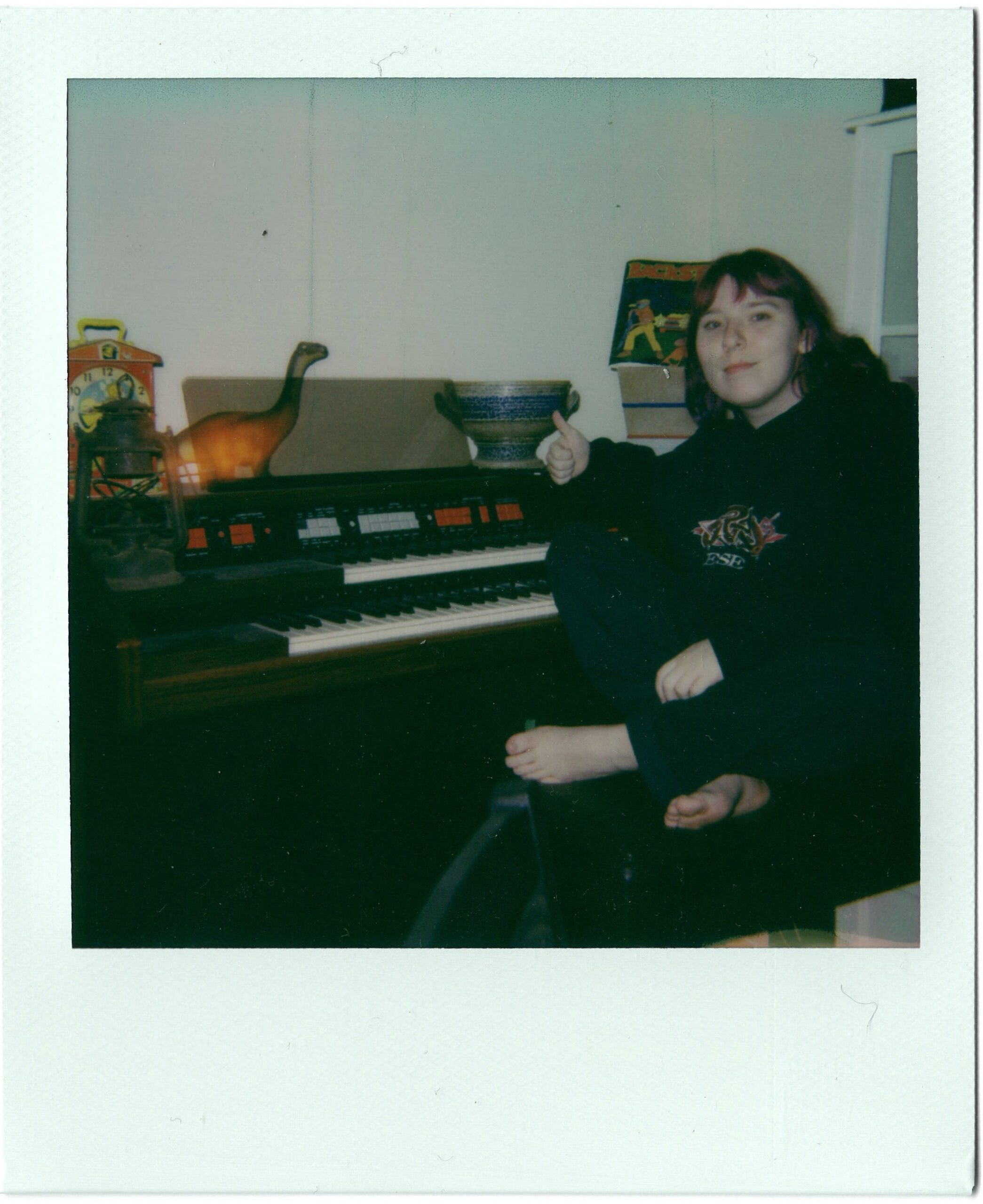Linqua Franqa, also known as Mariah Parker, is a multi-talented individual—not only a rapper, but also a Ph.D. candidate, parent, and politician living in Athens, Georgia. Bellringer, their newest album explores political topics, while also acting as a transformative and eloquent work of art. Throughout its course, Mariah weaves hip-hop hooks into their political drive to create a provocative and captivating record.
For me, Bellringer, has been on repeat since its release in April, reminding me of my own political roots. It’s also just a beautifully developed album in the way it constantly builds and the phenomenal lyrical moments it offers. Linqua Franqa’s flow is fast, while smooth and soft, sounding more like a poem than a typical verse. The imagery on the record can be rather dark, but in a way that allows the listener to understand their inherent political existence. Bellringer manages to have the coolest collaboration imaginable, as well, with Angela Davis being featured on the track “Abolition.”
Slumber mag had the pleasure of Zooming with Mariah, just before they went back to working on their dissertation. We talked about poetry, music, activism, and their own personal inspirations, as well.
(Note: This article includes mention of suicidal thoughts)
Slumber Mag: What/Who do you consider to be your influences musically, politically, etc?
Mariah Parker: Within the world of art–definitely draw a lot of inspiration from folks like Noname, particularly–her music isn’t always plainly political. She does kind of work in surrealism, I would say, but just watching her move and use her position as a quote-unquote, celebrity to advance like, explicitly…projects aimed at collective liberation. Boots Riley, as well–[I] love The Coop. I love the idea of revolutionary jams that you can twerk to. And I think they strike that balance quite well. Folks, like Mos Def, on the song “Mathematics,” particularly, was really influential for me, growing up and thinking about ingenious ways to get political, but also just like, aesthetically…
In the world of movement making, I’m very inspired, obviously, by Angela Davis. I take a lot of inspiration from the Black Panthers, Huey Newton and Elaine Brown, and Fred Hampton. I take a lot of inspiration as well from the Young Lords, which is sort of like the Puerto Rican counterpart to the Black Panther movement. They did a lot of direct action, mutual aid, occupations, buildings, etc. Um, who else? Who am I forgetting? What’s probably and then I mean, that in terms of like, wrote like old school folks.
As for more recent music, I really loved Goldlink’s album Haram from last year. Mick Jenkins had some new stuff that was dope. Vince Staple’s new album was pretty cool. So I’ve been really, really vibing with Tobe Nwigwe, which I think his last album came out like 2020. But it was really, really dope. Mach-Hommy, Pray for Haiti, I think it was called. It was really dope. Those are my main recent joints that I was super into.
Slumber: Bellringer talks about a lot of important topics. What issues do you consider are the primary focus?
MP: Well, I think latently the album touches upon the prison industrial complex, even when I’m talking about racial community violence, as in the story of Latasha Harlins in the first few tracks. It wasn’t just her death, but the failure of the criminal justice system to bring justice for her in her murder that helped spark the LA riots. When I think about mental health, especially here in Georgia, we rank 51 for mental healthcare resources. And so the ways that that pushes people into the claws of various punitive institutions, I’m talking about my own personal experience, but it does tie into that as well. There’s the track abolition at the end, where I’m using a world where the prison and the police are obsolete.
But even in a track, like, “Till We’re All Dead.” But I’m talking about the community coming together for collective action in the aftermath of police murder, all of these things just reflect on cycles of violence at various scales, political violence, policy violence in or community violence, interpersonal violence that the prison industrial complex and feeds on to sustain itself. And so that’s probably the most salient political thread that runs through the album as a whole.

Slumber: How did you get involved initially? How did you begin getting involved in political activism in your area?
MP: Organizing hip hop shows as a form of cultural organizing to desegregate a fairly segregated Athens music scene. And I got involved in the same venues where I would have shows hosting like postcard parties, where we would coach and socially support folks through writing postcards to their legislators, and calling their legislators, we provide scripts for people and that kind of thing. So, also using the same spaces that are organized in musically for political organizing, and then through the music, feeling like alright, cultural organizing, maybe is not enough, just because even if you desegregate the music scenes, people are still rapping about going to jail, people still rapping about being in gangs, people start rapping about mental health, and they can’t get treatment for the rapid route, you know, broken families, families torn apart by poverty. And these are all impacted by policy, the fact you go to jail for selling weed as a matter of policy, the fact that you can’t get access to mental health care is a matter of policy. And so I was like, alright, I’m gonna get involved in actually agitating for legislative change. And that ultimately culminated in me deciding to run for office myself in 2018. Yeah, and so I’ve been in here ever since.
Slumber: What advice would you give to young people, especially those in red states, who don’t have people to get involved with and are too afraid to get involved in activism?
MP: I think ceding coalitions for change, even where you feel like ideologically, there’s no one on your side. Socratic conversation, asking people: Why do you think that is? Why do you think that is? And why do you think that is? For example, in my case, I am a prison abolitionist. And so when somebody’s like, “What are we going to do about somebody breaking into my house and stealing my TV?” I’m like, Well, why do you think they did that? …”Oh, well, maybe they’re a junkie” like, Well, why are they a junkie? Why can’t they get the mental health resources, they need to stop robbing people to feed their habit? Oh, are they a junkie because they lost both their parents? …How do we stop that from happening?
And so like, having these conversations where we trace our problems back to their roots as a way to get people thinking differently, and then, you know, start, like, putting out 10 rules to like: Alright, now that we are both asking these questions, and both wondering how things can be different, what does different look like? So not necessarily reaching out and connecting with people who are already aligned, but aligning people through [a] willingness to just like, engage in good faith, asking questions that help us trace the foundations of our problems.
“[The album is] this whole journey from like, individualism, [from] I hate my life because everything's terrible to like, Okay...I accept where I'm at, and I'm gonna put it in service of the movement with others to change things.”
Slumber: Is there a story behind “Sometimes I hate this town,” if you’re comfortable talking about it?
MP: Yeah. So I was diagnosed with bipolar disorder in 2018. And, so I started trying out, you know, under the supervision of a psychiatrist, apart from various pharmaceutical interventions. And ultimately, when I was taken off lithium, in the spring of 2019, I experienced dramatically worsening suicidal ideation. And so when I saw when I went to the mental hospital, I was prescribed like five different drugs to take at once–mood stabilizers–and so that’s when I’m like…Wellbutrin and Gab-apentin Lexapro hasn’t fixed it. Like, they had me on everything in the encyclopedia. And so, when I got out, I sort of wrote about that experience of feeling like the medicalization of mental health problems that are ultimately systemic… My psychiatrist is just very cold and like, “Okay, here’s your prescription, have a nice day.” And these drugs don’t work because you’re still depressed about the society we live in as well.
The second verse is inspired by the aftermath of my swearing-in in 2018, like photos of the ceremony went viral, because I had sworn in on the autobiography of Malcolm X. And it unleashed this torrent of trolls, and critics and white supremacists, and folks that were threatening my life, critiquing my body, and all sorts of things. And so the idea of viral success, like everybody wants to be famous, right? But it actually comes with all this extra stuff that is really crippling emotionally and mentally. And so I talked about that.
And then…the last verse of mine is fictionalized, but it’s the kind of thing that I would frequently wonder about at that period in my life. But in closing, you know, I talk about Midge, Imani, Emma, Tommy, Louie, Charlie, and my kinfolk, thinking about the way that community is, can heal in ways that all these other things.
Slumber: Can you talk a little bit about how you organized Bellringer?
MP: Sure, there’s a narrative arc in Bellringer, where it kind of starts out, rooted in history rooted in 1991, Los Angeles, the Los Angeles riots [and] the murder of Latasha Harlins. And then talking about my own coping with the reality of the political utility of Black Death for the folks that run our country. But it keeps the prisons full, it keeps us all subordinate.
And so I talked about struggling mental health, I talked about trying to get famous and like it doesn’t help. It doesn’t help to be well known. It makes it worse in a lot of ways. And so tracing that trajectory of like, on growth to talking about, Okay, well, it’s different parts of me. I’m in school, I like going out and partying, I’m in politics, I’m making music, I’m on tour. Like, none of this makes sense. Who the fuck am I right? And so I’m reconciling all these parts and seeing that if I’m mortal, if I could die, I might as well push the system so hard. What Huey Newton calls revolutionary suicide of pushing a system so hard that like, maybe you get popped like I’m okay here…or Fred Hampton, you know, or one of those cats. And so…I talked about dedicating myself to the movement and then I kind of transition to talking about healing. “Oh F*ck” is about I’m gonna love me even if I got some imposter syndrome, etc. And then the next couple of tracks, talk about love, talk about loving yourself, loving other people bringing new life into the world, falling out of love, falling out of relationships, being in bad relationships.
And as we move into the final third of the album, it gets more explicitly: What do we do with all this? What do we do with the conditions of history, our current material, and social conditions? And that’s how I come upon work and abolition, let’s organize, you know, for economic justice, and let’s organize for a world reorganized, let’s agitate for a world reorganized around care instead of carcerality. So it’s this whole journey from like, individualism, [from] I hate my life because everything’s terrible to like, Okay, I accept, I accept where I’m at, and I’m gonna put it in service of the movement with others to change things.
Slumber: Was Bellringer always going to be your dissertation?
MP: No. So in January, one of my professors came to a show at Flicker, and she works in arts-based research. So these are folks that either use some sort of arts process in gathering, processing, or presenting their data. And so she came to my show, and I was like–holy shit–that should be your dissertation. And I was really aghast like floored, flabbergasted by that. But then I met with her, my main advisor, and really reconsidered like, I’d studied art space research…and all these different research frameworks and precedents for doing this kind of thing as a matter of inquiry. But I just didn’t believe that what I had said could ever matter to the academy. Like all these things, I kept hitting mental health problems, being ratchet, you know, all the stuff just didn’t, didn’t fit there.
But with their encouragement, I have since embraced that. I wrote to process a lot of what I have lived through and what we have lived through, and I’ve come to new conclusions, new knowledge of myself, new knowledge, and society. And I think it does have implications for education research, like if we want our classrooms and our education to reflect and uplift the experiences of our students. What do you do with experiences like this? If we’re talking about civics education, how do we talk about the fact that folks rioted in LA? How do we talk about the folks at like, you know, in “Till We’re All Dead” that organized a cop watch, when do we get to talk about collective bargaining? And so? Yeah, so it just turned out this way in the last four months.
Slumber: How do you balance all of this? Like, how do you balance being a parent, a county commissioner, a rapper, and a Ph.D. candidate?
MP: So my short answer is that I don’t. I think people like to imbue all those titles and hyphens with like, tints: Oh, that’s Oh, perfection. This person is perfect. When it’s like, it’s very key to trying to do all this that like you just have to keep if you’re juggling all this, you have to keep your eye on the ball that’s closest to the ground–which means like there’s…other balls up in the air, they flying everywhere sometimes, but just like trying to always, yeah, keep everything moving, which is messy…I mess up a lot. I fail oftentimes. And I learned…to have a lot of self-compassion and grace with my work because…it doesn’t always turn out the way that I want. Just because I’m doing a lot doesn’t mean I’m doing it well. I try my best, and I do a lot of good work that I am proud of, but just sort of like sitting with and becoming comfortable with the chaos is critical to just like [the] sustainability of the work, and not like bowing out because I feel like I’m not perfect.

Slumber: Would you describe your music to be more personally or politically charged?
MP: I would describe it in terms of my dissertation and my research framework, it’s autoethnographic. So ethnography is like the study of a culture. But then autoethnography is a means of writing a personal history and writing it into a relationship and connection with society and culture in a way that upends common sense knowledge. And so I’d say it’s a mixture of personal and political and that as I said, with hip hop more generally, a lot of my life circumstances are influenced by policy decisions that were made before I was born, and by people that will be dead long before I am. And so I tried to acknowledge that and connect the various scales together in a way that might illuminate them for other people.
Slumber: What made you decide to sample that protest song in “Wurk?”
MP: I had envisioned something that like, you could bump out of protests, you could bump when you’re in the kitchen, you could bump when your boss is pissing you off. And so I just drew from songs that I knew from protests, you know, the chant, El Pueblo Unido Jamás Será Vencido, from people singing and protests, Which side are you on? Only later to discover and like, Oh, I didn’t know if I didn’t consciously do that. These elements reach out to different communities and sort of draw like a sonic coalition of like, striking miners in rural Kentucky and immigrant farm workers, and folks that are in hip hop. Like, y’all, we’re all in this together if we, you know, stop bickering and fight the bosses like, we can all win. So I don’t know. It just randomly happened like that. But I was just like, Okay, how do I, how do I make this a vibe like you’re in a march right now?
Slumber: Um, how did the Angela Davis feature happen?
MP: Yeah, so she and I were co-keynote speakers at a youth summit in the fall of 2020. So we had a long conversation about international solidarity in police and prison abolition and the intergenerationality of movements. And so we stayed in touch ever since then, and then she ended up contributing some words on the excitement that she feels today. At the summit, I asked her, What do you think young folks can learn from the movement elders? and she was like “No, I learned from y’all. I’m so excited to see what y’all are doing. And, I’m so inspired” Yeah, just to this unique moment in history and future. So that’s what ended up on the album.
Slumber: What made you choose Angela Davis?
MP: Well the loop that is the foundation of the beat is a quote of hers. To be radical simply means to grasp things by the root, you know, radical, the root of that word. Like radish means root. So I was just sitting in my mom’s kitchen, hiding out after death threats during the uprising. And I just kept repeating that phrase until the harmony came to me and then that became the beat and then to have her on the song was an interesting complement.
Linqua Franqa’s album ‘Bellringer’ is out now:


